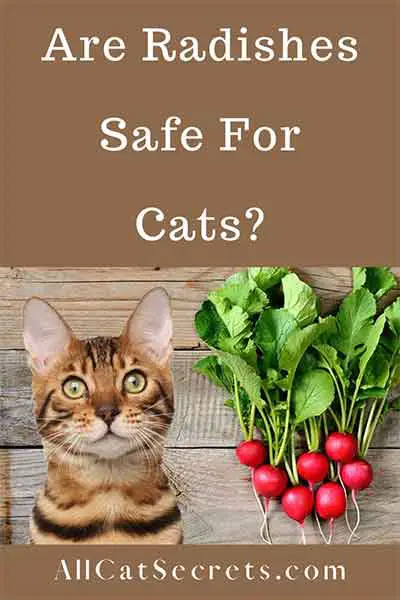Cats are known for their curious nature when it comes to exploring new foods. As a cat owner, you may have wondered if it is safe to share some of your favorite vegetables with your feline friend. One such vegetable that often raises questions is radishes. In this article, we will delve into the topic of whether cats can eat radishes and explore the potential benefits and risks associated with this root vegetable.

Can Cats Safely Consume Radishes?
Radishes belong to the Brassicaceae family and are packed with essential nutrients like vitamin C, fiber, and potassium. While radishes are generally safe for human consumption, it is important to consider whether they are suitable for cats as well.
The Nutritional Value of Radishes for Cats
Radishes offer a range of nutritional benefits for humans, but do these benefits extend to our feline companions? Let’s take a closer look at the key nutrients found in radishes and how they can potentially impact a cat’s health.
1. Vitamin C
Radishes are a good source of vitamin C, which plays a crucial role in supporting the immune system. However, cats have different dietary requirements compared to humans, and they naturally produce their own vitamin C. Therefore, while radishes contain this essential nutrient, it may not have the same impact on cats as it does on humans.
2. Fiber
Fiber is important for maintaining a healthy digestive system in cats. While radishes do contain fiber, it is worth noting that cats are obligate carnivores and primarily require animal-based proteins for optimal digestion. Therefore, while small amounts of fiber from radishes may not be harmful, it is not a necessary component of a cat’s diet.
3. Potassium
Potassium is an essential mineral that helps regulate various bodily functions, including heart health and muscle contractions. Radishes contain potassium, but it is important to note that cats have specific dietary requirements for this mineral. It is best to consult with a veterinarian to ensure your cat’s potassium needs are met through appropriate sources.
Potential Risks of Feeding Radishes to Cats
While radishes may offer some nutritional benefits, there are potential risks associated with feeding them to cats. It is crucial to be aware of these risks before introducing radishes into your cat’s diet.
1. Digestive Upset
Cats have sensitive digestive systems, and introducing new foods can sometimes lead to digestive upset. Radishes, especially when consumed in large quantities, may cause gastrointestinal issues such as diarrhea or vomiting in cats. It is important to introduce new foods gradually and monitor your cat’s reaction closely.
2. Allergic Reactions
Just like humans, cats can also develop allergies to certain foods. While radishes are not commonly known to cause allergies in cats, it is still possible for individual cats to have adverse reactions. If you notice any signs of an allergic reaction, such as itching, swelling, or difficulty breathing, discontinue feeding radishes immediately and consult a veterinarian.
Conclusion
In conclusion, while radishes may offer some nutritional benefits, they are not a necessary component of a cat’s diet. Cats have specific dietary requirements that are best met through a balanced and species-appropriate diet. If you are considering introducing radishes or any other new food into your cat’s diet, it is always recommended to consult with a veterinarian to ensure it is safe and appropriate for your feline companion.
FAQs
-
Can cats eat radish leaves?
Yes, cats can eat radish leaves in small quantities. However, it is important to ensure that the leaves are thoroughly washed and free from any pesticides or harmful chemicals. -
Are radishes toxic to cats?
Radishes are not considered toxic to cats. However, it is important to feed them in moderation and monitor your cat for any adverse reactions. -
Can radishes improve a cat’s digestion?
While radishes contain fiber, which can aid digestion in humans, cats have different dietary requirements. It is best to focus on providing a balanced and species-appropriate diet for optimal digestion in cats. -
Are there any alternative vegetables that are safe for cats to eat?
Yes, there are several vegetables that can be safely incorporated into a cat’s diet, such as cooked carrots, peas, or pumpkin. However, it is important to introduce new foods gradually and in moderation. -
Should I consult a veterinarian before feeding radishes to my cat?
Yes, it is always recommended to consult with a veterinarian before introducing any new food into your cat’s diet. They can provide personalized advice based on your cat’s specific needs and dietary requirements.

